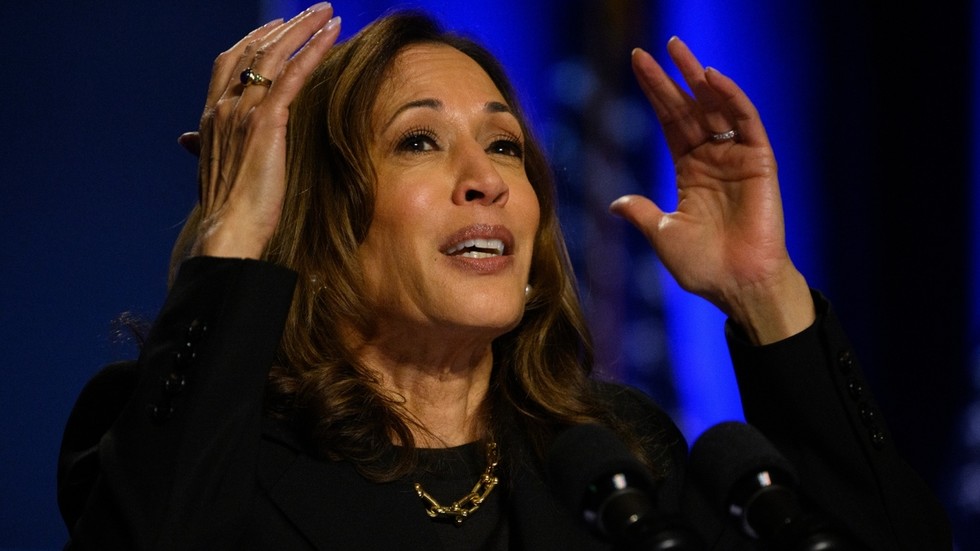In recent exchanges between U.S. political figures and the Russian embassy, tensions have been heightened by derogatory remarks made by U.S. Vice President Kamala Harris about Russian President Vladimir Putin. During an interview with radio host Howard Stern, Harris labeled Putin a “murderous dictator” and framed him as America’s “adversary.” This language has drawn sharp criticism from the Russian embassy in Washington, which described Harris’s comments as “unacceptable” and a direct affront to Russia and its citizens. The embassy characterized such rhetoric as indicative of frustration and impotence among U.S. political leaders, suggesting that it reflects the inability of the Washington elite to effectively engage with Russia or navigate the ongoing conflict with Ukraine.
The Russian embassy expressed offense at the remarks made by Harris, stating they are not merely personal insults but also offensive to the Russian populace, who purportedly stand united behind their leadership. This response highlights a recurring element in diplomatic exchanges where leaders use particularly charged language to signal dissent and assert national pride. It seems the Russian embassy is keen to portray a united front among its citizens, countering any perceived divide that U.S. criticisms may suggest. The embassy also condemned the perceived habitual nature of “boorish language” among American statespeople, framing it as a failure of the current U.S. administration to engage constructively with Russia.
Moreover, the Russian response called on U.S. leadership to recalibrate its approach, urging American officials to acknowledge that Russia is acting in accordance with its national interests. This comment indicates an expectation for more diplomatic discourse rather than aggressive denunciations, pointing toward a broader desire for stability in U.S.-Russia relations. The diplomatic language suggests an element of irony, as Russia has often faced criticism for its own actions that others deem aggressive or against the interests of neighboring states. Nonetheless, the embassy’s rhetoric can be seen as a strategic move to deflect blame from Moscow while promoting a narrative of rational policy-making in the face of supposed U.S. hostility.
Interestingly, President Putin recently expressed support for Kamala Harris as a potential contender for the U.S. presidency, prompting widespread media attention in the U.S. Putin’s prior endorsement of President Joe Biden seemed to underscore a diplomatic nuance, where he claimed that Harris would not impose the same level of sanctions that opposition candidate Donald Trump enacted during his presidency. This statement adds layers to the ongoing dialogue surrounding U.S. elections, implying a desire for partisan politicking to be devoid of negative Russian influences yet paradoxically drawing the Kremlin into electoral discussions. The White House reacted firmly to any insinuations regarding the Russian leader commenting on American electoral matters, reaffirming the general frustration over foreign voices in domestic politics.
The Russian president’s comments were later downplayed by Russian Foreign Minister Sergey Lavrov, who asserted that Putin’s remarks were made in jest rather than as serious endorsements. This positioning serves to disentangle Russia from any formal implication in U.S. electoral politics, which could have detrimental effects on its international standing. In a landscape rife with political maneuvering, Lavrov’s explanation reinforces a tendency within Russian discourse to deploy humor as a diplomatic tool, particularly when navigating complex relationships with Western powers. It highlights the nuanced ways in which humor may disarm criticism or soften the impact of politically charged statements.
Kremlin spokesperson Dmitry Peskov also weighed in, noting that both leading candidates in the U.S. presidential race maintain an unfriendly attitude toward Russia. This candid acknowledgment from the Kremlin points toward a broader realization that regardless of the electoral outcome, the bilateral relationship remains fraught with tension. By positioning Putin’s name at the center of American political discourse, the Kremlin expresses its discontent with being used as a pawn in internal U.S. power struggles. This pattern not only complicates U.S.-Russia relations but also suggests the Kremlin’s interest in preserving its political narrative against foreign interference, maintaining sovereignty over its internal matters while simultaneously engaging in international rhetoric.

